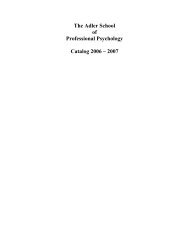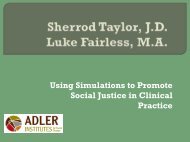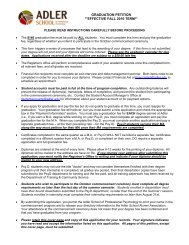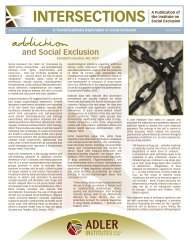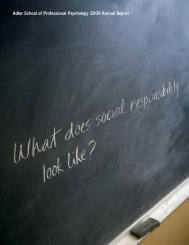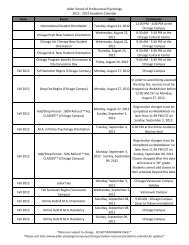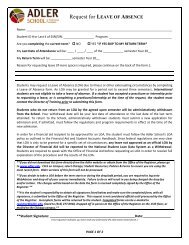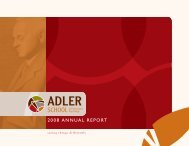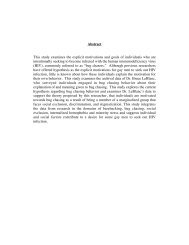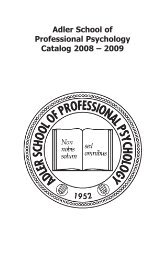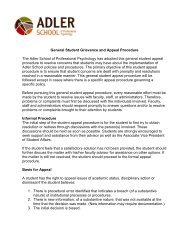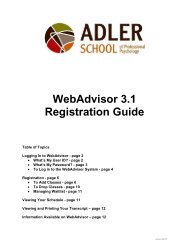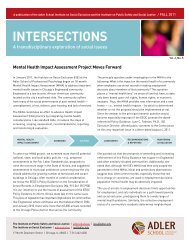INTERSECTIONS - Adler School of Professional Psychology
INTERSECTIONS - Adler School of Professional Psychology
INTERSECTIONS - Adler School of Professional Psychology
You also want an ePaper? Increase the reach of your titles
YUMPU automatically turns print PDFs into web optimized ePapers that Google loves.
The <strong>Adler</strong> Community Health Services (ACHS) has been<br />
providing services to men and women getting out <strong>of</strong> prison for<br />
a number <strong>of</strong> years within a half way house setting. ACHS serves<br />
the men and women living at St. Leonard’s House and Grace<br />
House on Chicago’s Westside. These mental health services<br />
are key in aiding individuals leaving prison to rebuild their lives<br />
and their sense <strong>of</strong> hope, future, and family.<br />
This year the Institute on Public Safety and Social Justice<br />
(IPSSJ) will be summarizing and evaluating the work <strong>of</strong> ACHS<br />
for those living at St. Leonard’s and Grace House. It is hoped<br />
that this summary will provide a deeper understanding <strong>of</strong> the<br />
ways in which formerly incarcerated individuals need additional<br />
support and care to successfully avoid recidivism, and build the<br />
skills necessary to reintegrate into society.<br />
More specifically, the current endeavor is a full program review<br />
<strong>of</strong> all <strong>of</strong> the psychological services provided to St. Leonard’s<br />
House by ACHS. Currently, an evaluation is being designed to<br />
track key indicators <strong>of</strong> program effect. This will allow ACHS<br />
to redesign the program as necessary, and to manualize both<br />
program and corresponding training. This goal is to develop<br />
a full understanding <strong>of</strong> successful program elements that can<br />
be replicated by other agencies and halfway houses that serve<br />
the mental health needs <strong>of</strong> the formerly incarcerated.<br />
The ISE Hosts William T. Bielby, Expert Witness<br />
in the Wal-Mart Case at Supreme Court<br />
By Rachel Eddy, <strong>Adler</strong> <strong>School</strong> Student<br />
The <strong>Adler</strong> <strong>School</strong><br />
was proud to host<br />
William T. Bielby, Ph.D.,<br />
on September 21, 2011.<br />
Dr. Bielby was an expert<br />
witness in the highly<br />
controversial Wal-Mart<br />
Stores, Inc. v. Dukes<br />
lawsuit, which was<br />
one <strong>of</strong> the most<br />
publicized employment<br />
discrimination cases to<br />
date. Did Wal-Mart, the<br />
nation’s largest retailer and private employer, discriminate<br />
against women Dr. Bielby believed Wal-Mart’s policies led to<br />
inevitable gender bias used by managers to be subjective in<br />
their pay and promotion decisions, which were generally made<br />
in favor <strong>of</strong> their male employees.<br />
The class-action lawsuit involved six female plaintiffs, who<br />
argued that Wal-Mart’s corporate culture invited managers to<br />
“act on their own worst instincts,” thereby treating women<br />
unfairly on compensation, promotions, and job assignments.<br />
Women comprise more than 65 percent <strong>of</strong> hourly employees<br />
throughout the Wal-Mart organization, yet only 34.5 percent<br />
<strong>of</strong> managers are women. It has also been noted that it takes<br />
women on average 4.38 years to rise to a management position,<br />
while it takes men only 2.86 years to gain similar managerial<br />
positions. In order to better illustrate the clear gender bias<br />
issues presented in this case, the plaintiffs enlisted the support<br />
Dr. Bielby, who aided in their prosecution <strong>of</strong> the case.<br />
Dr. Bielby is a pr<strong>of</strong>essor <strong>of</strong> Sociology at the University <strong>of</strong> Illinois<br />
Chicago and specializes in social framework analysis. Social<br />
framework analysis is structured around the stereotypes and<br />
biases that people naturally, albeit unconsciously, hold - people<br />
have the tendency to act on their own unconscious stereotypes<br />
and biases whenever they are given the opportunity to do so,<br />
with no regard for the potential consequences to themselves<br />
or others. Dr. Bielby applied the concept <strong>of</strong> social framework<br />
analysis to the Wal-Mart lawsuit, focusing on gender bias,<br />
stereotypes, and the structure and dynamic <strong>of</strong> gender inequality<br />
in major organizations such as Wal-Mart.<br />
Dr. Bielby concluded that, by having a centralized personnel<br />
policy and permitting subjective decisions to be made by field<br />
managers, Wal-Mart allowed stereotypes to greatly influence<br />
personnel choices. Therefore decisions made regarding pay or<br />
promotion became highly vulnerable to gender bias. Although<br />
discrimination and intentional bias in the workplace is illegal<br />
and socially unacceptable, it continues to have an influence on<br />
decisions made within the workforce.<br />
Ultimately, the U.S. Supreme Court ruled in Wal-Mart’s favor,<br />
stating that there was too much variance in the plaintiffs’<br />
circumstances to constitute a class. Although the plaintiffs’<br />
position was not victorious, the question <strong>of</strong> hidden bias remains.<br />
How can we prevent our own stereotypes and biases from<br />
infecting our everyday decisions Is any company truly immune<br />
to unconscious bias These are questions that the courts will<br />
probably have to address on other days.<br />
Bielby’s talk September 21 was hosted by the Institute on<br />
Social Exclusion and Women Employed, Inc.<br />
page 4



